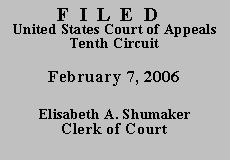

| JAMES DAVID BLUE THUNDER,
Petitioner-Appellant, v. UNITED STATES PAROLE COMMISSION; DAVE JOHNSON, Executive Director - halfway house; E. MAURREN JANSSEN, U.S. Parole Officer, Respondents-Appellees. |
|
Petitioner James David Blue Thunder, a federal prisoner appearing pro se, appeals the district court's dismissal of his 28 U.S.C. § 2241 petition challenging the 1998 revocation of his parole. The district court dismissed the petition, holding that petitioner was abusing the writ by raising the same issues he unsuccessfully raised in a previous § 2241 petition. This court exercises jurisdiction under 28 U.S.C. § 1291, and affirms.
Petitioner was convicted of first degree murder in 1978 for killing his former wife. See United States v. Blue Thunder, 604 F.2d 550, 552 (8th Cir. 1979). Although he was sentenced to life imprisonment, petitioner was paroled in 1995. His parole was revoked in 1998, after he was charged with defrauding the Veteran's Administration; violating the special conditions of his release; assaulting his current wife and her children; sexually assaulting his wife's daughter; and having unlawful sexual contact with a four-year old girl.
In 2001, petitioner filed a petition for writ of habeas corpus pursuant to § 2241 in the United States District Court for the District of Colorado. He named the same defendants and raised the same issues as in his current § 2241 petition, namely, that the defendants exceeded their jurisdiction with respect to the fraud charge and denied him due process in revoking his parole. See Blue Thunder v. Gallegos, No. 01-WM-1965 (D. Colo. May 17, 2002) (unpublished order). The district court dismissed the petition on the merits, finding that the defendants acted within their jurisdiction and did not deny him due process because there was a rational evidentiary basis for the revocation findings. Petitioner did not appeal.
Petitioner filed his second § 2241 in June 2004 in the United States District Court for the District of Columbia. Because petitioner is incarcerated in Colorado, the petition was transferred to the Colorado federal district court. Petitioner raised the same issues in his second § 2241 petition as he had in the first: he again claimed the defendants exceeded their jurisdiction and denied him due process. The district court ordered petitioner to show cause why this petition should not be dismissed as being a second, abusive writ. In response, petitioner asserted that defendant Janssen concealed material information at his 1998 parole revocation hearing, and that this fraud continued through his first § 2241 proceeding. The district court dismissed the petition as an abusive writ pursuant to 28 U.S.C. § 2244(a), concluding that plaintiff had unsuccessfully raised the same issue concerning the revocation of his parole. Petitioner appeals.
This court reviews the district court's legal conclusions in dismissing a § 2241 habeas petition de novo. Patterson v. Knowles, 162 F.3d 574, 575 (10th Cir. 1998). Under § 2244(a), a district court may dismiss a petition for writ of habeas corpus brought pursuant to § 2241 if it appears that a federal court has previously passed on the legality of the petitioner's detention in a prior habeas application and no new claim is raised. George v. Perrill, 62 F.3d 333, 334 (10th Cir. 1995). Where the second or successive petition raises a new claim that could have been raised previously, the abuse-of-the-writ doctrine applies. McCleskey v. Zant, 499 U.S. 467, 483-84 (1991); see also George, 62 F.2d at 334-35. A petitioner must then demonstrate cause and prejudice or a fundamental miscarriage of justice if the claim is to be heard. George, 62 F.2d at 335
We have carefully reviewed both of the § 2241 petitions, petitioner's brief, the district court's disposition, and the record on appeal. Nothing in the facts, the record on appeal, or petitioner's brief demonstrates that there is any issue justifying a review of his petition under the "cause and prejudice" or "fundamental miscarriage of justice" exceptions. See id. Accordingly, the district court did not err in denying petitioner's § 2241 petition as an abuse of the writ.
The judgment of the district court is AFFIRMED. Appellant's motion to proceed in forma pauperis is granted.
Entered for the Court
Circuit Judge
*. This order and judgment is not binding precedent, except under the doctrines of law of the case, res judicata, and collateral estoppel. The court generally disfavors the citation of orders and judgments; nevertheless, an order and judgment may be cited under the terms and conditions of 10th Cir. R. 36.3.